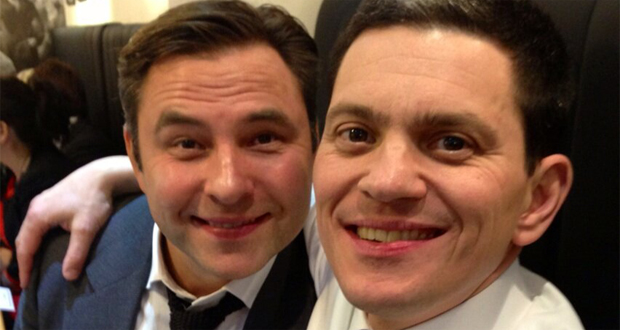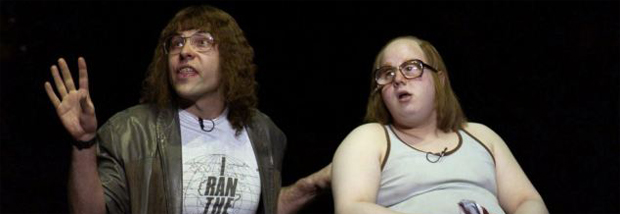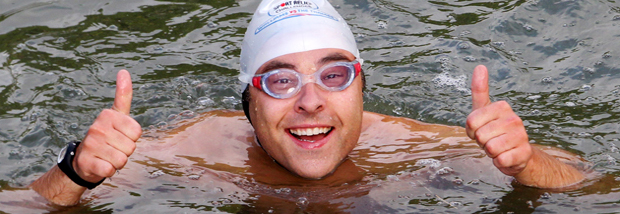The Two Davids: South Shields Lecture 2013 – with David Walliams

David Walliams and David Miliband are the unlikeliest of double acts.
At tonight’s 2013 South Shields Lecture, The Two Davids – as I’ve christened them – take centre stage. MP Miliband, brother of Labour Party leader Ed, rests awkwardly against a table on stage (he’s definitely the straight man…), while Walliams, this year’s special guest, nudges his shoulder, flirting and teasing Miliband out of that tired old political script.
Not quite The Two Ronnies, but this could almost be a lost Sebastian sketch from Walliams’ hit series Little Britain.
Now in its eleventh year, the free Labour Party event has previously welcomed the likes of Patrick Stewart, Bill Bryson, Tony Blair and fellow comic Jo Brand to the coastal town. But unlike his predecessors, Walliams seems an improbable Labour Party figurehead – especially when you consider his roots.
Brought up in Banstead, Surrey, Walliams’ mother was a lab technician, and his father worked as an engineer on the London underground. They were both staunch Tory voters; well off too, but “not, you know, too much.”
His first political exposure came on the cusp of 1979, when he caught a news report on the soon-to-be Prime Minister, Margret Thatcher. He recalls how, at the age of eight, he watched miners trading blows with police officers on TV, and knew something was wrong.
It tinted his political conscience – away from his Conservative-led parents and towards the Labour Party: “I’ve always believed the Labour Party was a vote for kindness and fairness, whereas a vote for the Conservatives is just a vote for yourself,” he says.
Despite their political differences, Walliams always craved the approval of his parents, particularly dad Peter. “I think a lot of people feel that way… Maybe what I was doing – wearing a dress on stage [at the age of 11] – was just so far removed from his life; maybe it was that thing about the father being jealous of the mother and son relationship… I’m not sure.”
Peter died of liver cancer in December 2007, but not before seeing Walliams’ partnership with pal Matt Lucas flourish on the national stage, first with Rock Profile then Little Britain.

Walliams and Lucas met at the National Youth Theatre when Matt was 16 and David was 18. They immediately hit it off, and followed each other to the University of Bristol, where they developed the script for Little Britain.
“Matt used to do this thing where he’d go around Bristol and ask everyone, ‘How are you? How are you? How are you?’ Most people just ignored him, but there was this one young boy who said, ‘I’m alright. I’m good. Well…I dunno. I am, but…yeah, but, no, but…’ And a few years later we had Vicki Pollard.
“People ask me about the key to our success but it’s all about having a good ear. You just need to store these things in your brain and use them when you can.”
It wasn’t all plain sailing, though. At tonight’s lecture Walliams talks about awful comedy sketches that haven’t seen the light of day in years – gay Christian strip troupe Res-erection, anyone? – and writing “that should never have got published.”
“To be funny you need to learn to accept that sometimes you’re unfunny,” he says. “I remember me and Matt [Lucas] doing an Edinburgh preview show to four people at the [Jackson’s Lane] community centre in London. It wasn’t great.
“Five minutes before we were due to go on stage someone rang up and said, ‘We want to bring a group to the show, but…we’d like to see the end of Eastenders first. Will you wait?’ Well, of course we will. They were our audience!”
As he is quick to point out, this was not an overnight success story. It took Walliams and Lucas eight years of stage work – and several TV rejections – before digital channel Play took a punt on Rock Profile. The BBC gave the second series a home on BBC Two, before Radio 4 ordered nine episodes of another character sketch show by Walliams and Lucas: Little Britain.
Their most popular show to date, Little Britain was quickly moved to TV for BBC Three, before the duo “really hit the big time” on BBC One. “I don’t think me and Matt [Lucas] were quite aware of how popular it had become,” Walliams admits.
Together Walliams and Lucas wrote three TV series of Little Britain as well as a hugely successful live stage show in 2006. A US spin-off series by HBO followed in 2008, featuring the same characters as the UK version, but Little Britain USA lasted just one season.
Walliams and Lucas’ last project together was Come Fly With Me, another character sketch series. Despite its critics, the BBC One show was the most watched comedy in 2010, and the duo were due to write a second series last year – until Lucas pulled the plug.
Going it alone, Walliams began writing children’s novels in 2008 (he has sold over 2,000,000 copies to date), and in 2012 he followed in Michael McIntyre’s footsteps as a judge on Britain’s Got Talent, further propelling him into the public eye. But does he enjoy the attention that comes with being a household name?
“Fame is a strange thing,” Walliams says. “I was quite unsure about it until I realised it could be used for good. When I swam the English Channel for Comic Relief I wasn’t the only one to do that – I was number 666 actually. But when you reach that level of fame it really just allows you to go on radio and ask strangers for money…
“I’ve never been a sporty person – surprise, surprise – but swimming was the only thing I was sort of good at. I was in Ethiopia when the head of Comic Relief said to me, ‘If you could do anything what would you do?’ That’s quite a broad question, but I said, ‘Swim the Channel,’ and he said, ‘Right, you’re doing that for Sport Relief.’
“I only did [the swim] because it was for charity. It’s not something that satisfies me personally.”
In case you were wondering, Walliams crossed the Channel in just ten and a half hours, securing his place in the top 50 fastest swimmers to complete the challenge since records began in 1927.

All in all, the Little Britain star has raised around £8m for charity since 2003 – namely in foreign aid – but tonight’s question and answer session brings the conversation closer to home, to the cuts North East communities are facing right now.
One woman explains how her Indian dance class in South Shields suffers from a lack of funding, but she perseveres because she can see the class brings well-being to her group, that the kids are really benefiting from the project.
Another local resident asks about the spending cuts implemented by Chancellor George Osborne. In a time when public funding is being squeezed from all avenues, not least from non-commercial ventures, how would – or could – Walliams justify further arts spending?
“It’s difficult to say because the counter-argument is that the money is better spent on hospital beds and welfare – and these things do save lives. You can’t say the arts are more important than that because they’re not.
“But the great thing about Britain is its culture – we gave the world William Shakespeare – and it would be terrible to lose that…”
Walliams stalls, clearly unsure about how to approach a subject so divisive within the North East community. “I do think art is life-enhancing,” he finally decides. “Not all art can be commercial, you know… It might be as important as a hospital bed but there’s a place for it.”
His own position remains unclear. Walliams’ political awareness, like my own, is A-Level quality at best, but to be fair the Little Britain star never claims to have the answers to today’s political ponderings: “I’ve always shied away from nights like this because I just don’t know if I have the knowledge.
“Tony [Blair] and Gordon [Brown] asked me to do things and I’ve been invited on Question Time a couple of times. I’m just not sure where politics and entertainment can meet.”
Don’t expect Walliams to be challenging Boris Johnson for Mayor of London anytime soon, then. “I know Eddie Izzard has mentioned [running for Mayor of London] before, and having met Eddie I know he’s a very principled man.
“I don’t have those kind of principles, and I don’t know why anyone would want to swap being a comedy writer for an MP…
“I find it all a bit boring,” he finally concedes. “No offence.”



































